
Internal Macedonian Revolutionary Organization – Democratic Party for Macedonian National Unity is a political party in North Macedonia and one of the two major parties in the country, the other being the Social Democratic Union of Macedonia.

The Social Democratic Union of Macedonia is a social-democratic political party, and the main centre-left party in North Macedonia.

The Democratic Union for Integration is the largest ethnic Albanian political party in North Macedonia and the third largest political party in the country. It was formed immediately after the country's 2001 armed conflict between the National Liberation Army (NLA) and Macedonian security forces. NLA leader Ali Ahmeti has been the party's president ever since.
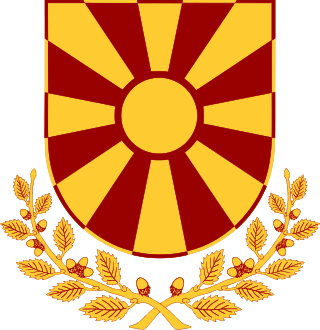
The president of the Republic of North Macedonia is the head of state of North Macedonia.
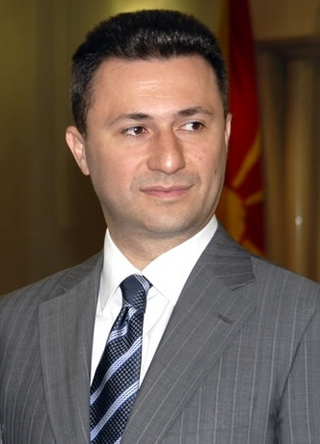
Nikola Gruevski is a Macedonian politician who served as Prime Minister of Macedonia from 2006 until his resignation, which was caused by the 2016 Macedonian protests, and led the VMRO-DPMNE party from 2004 to 2017.
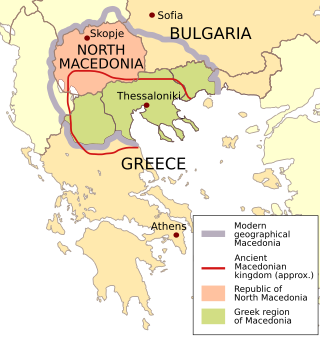
The use of the country name "Macedonia" was disputed between Greece and the Republic of Macedonia between 1991 and 2019. The dispute was a source of instability in the Western Balkans for 25 years. It was resolved through negotiations between Athens and Skopje, mediated by the United Nations, resulting in the Prespa agreement, which was signed on 17 June 2018. Pertinent to its background is an early 20th-century multifaceted dispute and armed conflict that formed part of the background to the Balkan Wars. The specific naming dispute, although an existing issue in Yugoslav–Greek relations since World War II, was reignited after the breakup of Yugoslavia and the newly-gained independence of the former Socialist Republic of Macedonia in 1991. Since then, it was an ongoing issue in bilateral and international relations until it was settled with the Prespa agreement in June 2018, the subsequent ratification by the Macedonian and Greek parliaments in late 2018 and early 2019 respectively, and the official renaming of Macedonia to North Macedonia in February 2019.

Gjorge Ivanov is a Macedonian politician, who served as the 4th President of North Macedonia from 2009 to 2019.
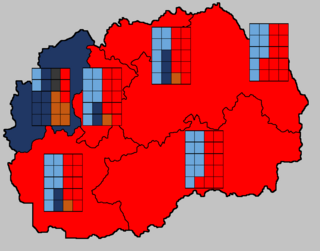
Early parliamentary elections were held in the Republic of Macedonia on 5 June 2011, a year earlier than necessary. All 123 parliamentary seats of the Sobranie were due for election, including the 3 seats provided for the first time for representatives of the Macedonian citizens living abroad: 1 from Europe, 1 from North America, and 1 from Asia and Australia. The decision of the ruling parties, the Christian Democratic VMRO-DPMNE and the ethnic Albanian Democratic Union for Integration (DUI), to dissolve the Parliament and call for an early election was preceded by protests of the Social Democratic Union (SDSM), the major opposition party, and subsequent boycott of the Parliament by them, and by other smaller opposition parties.
The 2011 Macedonian protests against police brutality or simply 2011 Macedonian protests were demonstrations that started on 6 June 2011 as а result of the murder of the 22-year-old Martin Neškovski, who was beaten to death by Igor Spasov, a member of the special police forces Tigers. The case itself is also tied to the 2015 Macedonian protests.

Bulgaria–North Macedonia relations are the bilateral relations between the Republic of Bulgaria and the Republic of North Macedonia. Both countries are members of the Council of Europe, and NATO. Bulgaria is a member of the European Union. Bulgaria was the first country to recognize the independence of its neighbour in 1992. Both states signed a friendship treaty in 2017. North Macedonia has been attempting to join the EU since 2004, while EU governments officially gave their permissions to enter accession talks in March 2020. Nevertheless, North Macedonia and Bulgaria have complicated neighborly relations, thus the Bulgarian factor is known in Macedonian politics as "B-complex".
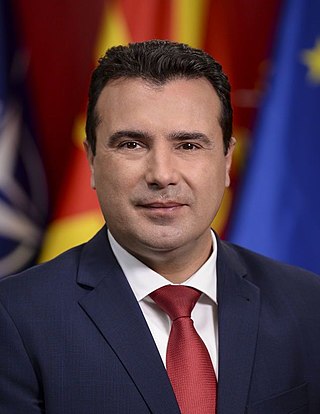
Zoran Zaev is a Macedonian economist and politician who served as prime minister of North Macedonia from May 2017 to January 2020, and again from August 2020 to January 2022.

A shootout which erupted during a raid between the Macedonian police and an armed group identifying itself as the National Liberation Army (NLA) occurred on 9 May 2015 in the northern Macedonian town of Kumanovo. During the shootings, eight Macedonian policemen and 10 of the militants were killed, while 37 officers were wounded and hospitalized. The shooting ended on 10 May 2015, in an operation by the Macedonian police and armed forces, in which 28 men were arrested and charged with terrorism-related charges by the Macedonian authorities.
Mile Janakieski is a Republic of Macedonia politician. He served as Minister of Transport and Communications in the cabinet of Prime Minister Nikola Gruevski until 12 May 2015.

Early parliamentary elections were held in Macedonia on 11 December 2016, having originally been planned for 24 April and later 5 June.
The Przino agreement or agreement from 2 June – 15 July 2015 was a political agreement between the main political parties in the Republic of Macedonia with the mediation of the European Union. The agreement ended the Macedonian political and institutional crisis in the first half of 2015. It foresaw: the participation of the opposition party SDSM in the ministries; the early resignation of prime minister Nikola Gruevski in January 2016 and a caretaker government to bring the country to general elections in June 2016, as well as a Special prosecutor to lead the investigations about the eventual crimes highlighted by the wiretapping scandal.

In April 2016, protests began in the Republic of Macedonia against the incumbent President Gjorge Ivanov and the government led by the interim Prime Minister Emil Dimitriev from the ruling VMRO-DPMNE party. Referred to by some as the Colorful Revolution, the protests have started after the controversial decision by President Gjorge Ivanov to stop the investigation against former Prime Minister Nikola Gruevski and dozens of politicians who were allegedly involved in a wiretapping scandal. The demonstrations were organized by "Protestiram" and supported from coalition led by the Social Democratic Union of Macedonia, and other opposition parties, also the newly formed Levica demanding that the government resigns for the formation of a technical government, and that the parliamentary elections planned for 5 June 2016 are cancelled, on the grounds that the conditions for free and transparent elections are not in place. The government and its supporters, who have organized pro-government rallies, maintain that the elections on June 5 are the only solution to the political crisis, with some observers blaming the opposition for creating a "Ukraine scenario" in Macedonia.
The following lists events from the year 2016 in the Republic of Macedonia.

Storming of the Macedonian Parliament, also known as Bloody Thursday occurred on 27 April 2017, when about 200 Macedonian nationalists stormed the Macedonian Parliament in reaction to the election of Talat Xhaferi, an ethnic Albanian, as Speaker of the Assembly of the Republic of Macedonia. It was the biggest attack in history on a Macedonian institution.

The Prespa agreement, also known as the Treaty of Prespa, the Prespes deal or the Prespa accord, is an agreement reached in 2018 between Greece and the then-Republic of Macedonia, under the auspices of the United Nations, resolving a long-standing dispute between the two. Apart from resolving the terminological differences, the agreement also covers areas of cooperation between the two countries in order to establish a strategic partnership.

Dimitar Kovačevski is a Macedonian politician and economist serving as prime minister of North Macedonia since 17 January 2022. A member of the Social Democratic Union of Macedonia (SDSM), Kovačevski previously served as deputy finance minister from 2020 until his appointment as prime minister in 2022 after the resignation of the previous prime minister.















